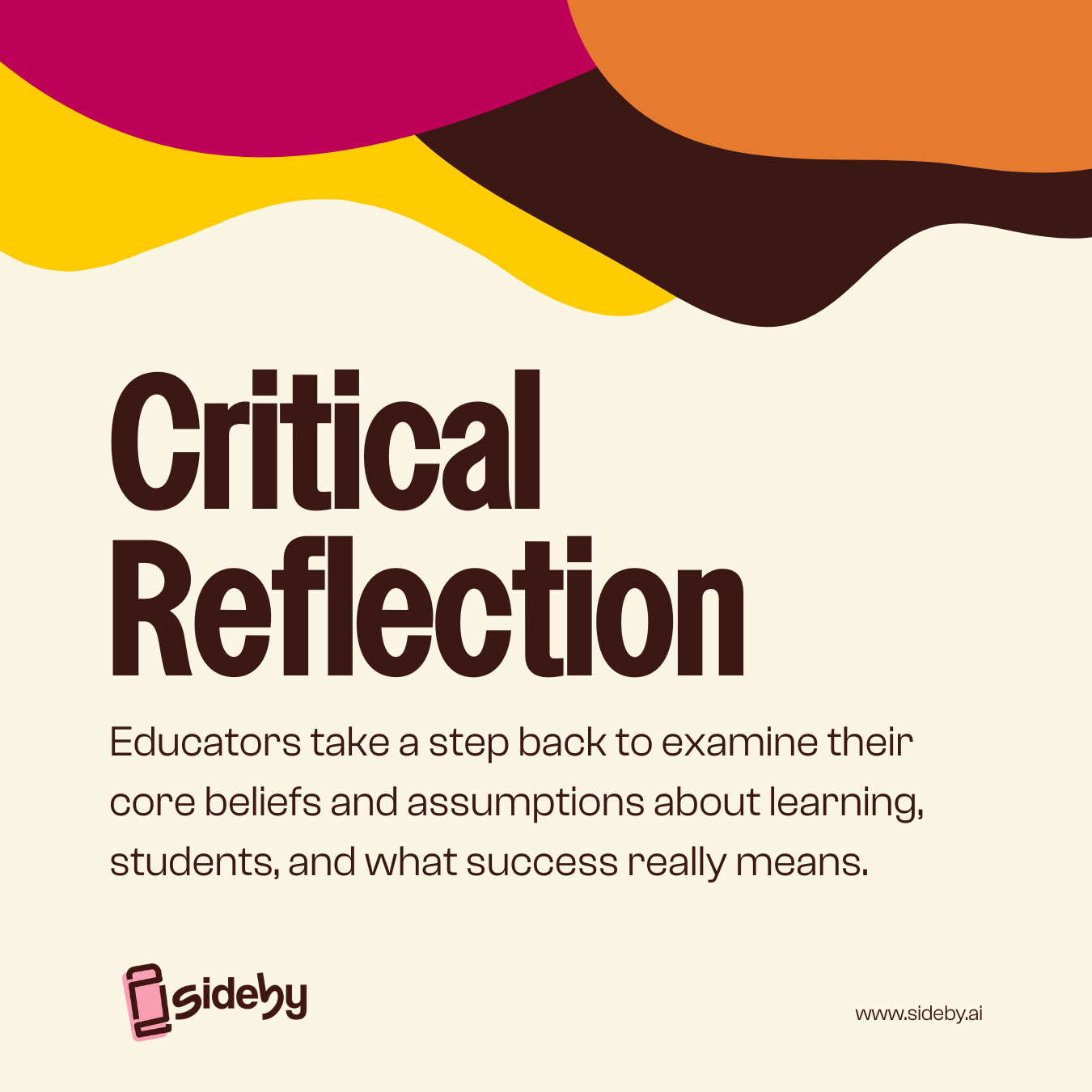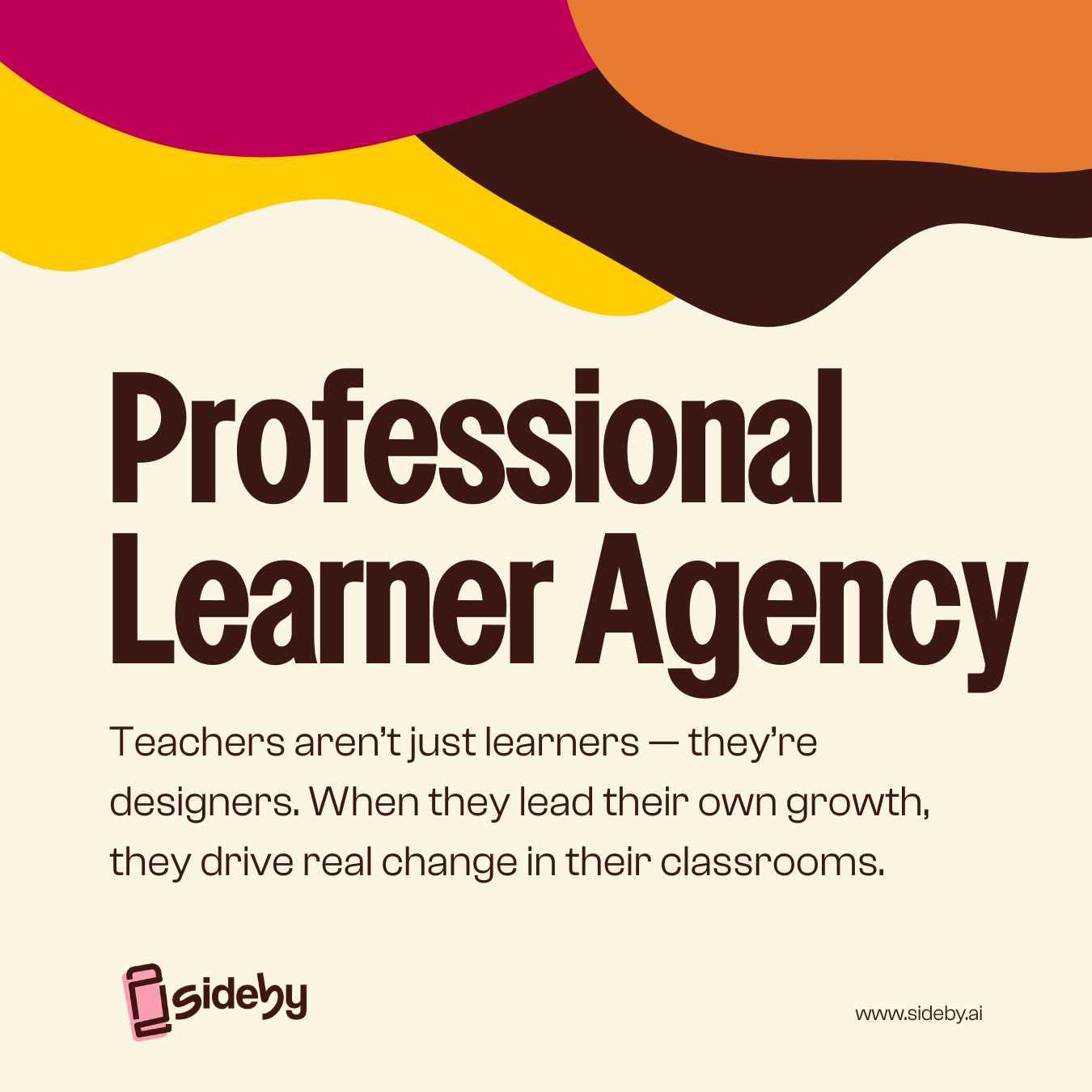Why Educators Deserve Transformational Professional Learning
By Kippy Smith and Erica Crane, EdD
TL; DR
Educators deserve transformational, not transactional, learning.
True professional growth reshapes identity, not just practice.
sideby’s 1:1 peer learning model fosters agency, relevance, and reflection.
Transformational PD leads to better teacher retention, engagement, and student outcomes.
Halfway through a PD workshop, a fantastic teacher sent the sideby team a text lamenting her experience:
“I am sitting in perhaps the worst PD course ever. We just sat through three hours straight with two, 5-minute turn -and- talks and otherwise, they have been talking and talking at us.”
Her negative experience illuminates what transactional approaches to educator development look like- and why they miss the mark. Not only does a transactional approach to PD often create an undesirable experience, it’s also profoundly insufficient for the complex, rapidly evolving K12 education landscape. With persistent, post-pandemic student learning challenges and game-changing innovations like AI, teachers’ roles must shift from passive PD recipients and compliant implementers to lead learners, creative innovators, and critical evaluators. Individually, educators need– and deserve!-- transformational learning. As a whole, the K12 ecosystem needs educators to fuel the collective learning the field at large must do to evolve.
Defining Transformational Learning
Unlike transactional learning that focuses on knowledge transfer, transformational learning focuses on deep, sustained professional growth. Often irreversible, this type of growth involves developing new ways of thinking and being, in addition to new ways of doing (e.g., practices, skills). By design, transformational learning supports professionals to durably shift their practice and their mindset. Because transformational learning sticks, investments in transformational PD pays dividends over the long-term, in the form of increased educator retention, engagement and growth, as well as improved student learning.
Transformational learning experiences for educators are characterized by several interrelated attributes:
Critical Reflection: Teachers examine their underlying beliefs, assumptions, and biases about teaching, learning, and equity (Cranton, 2006; hooks, 2010; Mezirow, 1991).
Dialogue and Collaboration: Peer learning is typically fostered within collaborative learning structures, in which educators engage with diverse perspectives and co-construct new understandings (hooks, 1994; Wenger, 1998).
Authenticity and Relevance: Experiences are most impactful when they are interconnected with educators’ lived experiences and when they support application of new ideas to teachers’ contexts (hooks, 1994, Freire, 1970; EL Education, 2018).
Professional Learner Agency: Transformational learning empowers teachers to take ownership of their development, make instructional decisions, and enact change in their classrooms and schools (Brookfield, 2000; Biesta et al., 2015; Darling-Hammond, 2022; Darling-Hammond et al., 2017; Darling-Hammond et al., 2009). Darling-Hammond et al. (2017) argues that when educators are actively engaged in designing and directing their own professional learning, they develop deeper ownership of instructional changes which can ultimately yield improved student engagement and academic performance.
Collectively, these attributes create a dynamic, reflective, and relational learning environment that moves beyond technical skill-building to foster meaningful professional identity transformation. These kinds of experiences also demonstrate a valuing of the educator as a professional learning expert.
Transformational Learning at sideby
sideby’s educator learning platform is a great example of these attributes in action. sideby exists to facilitate a transformational learning journey for educators, in service of transformed student learning.
sideby’s open educator learning community on integrating AI into teaching & learning offers educators an energizing, transformative professional development experience (at no cost) by connecting educators to learn and grow side by side. Through strategic matching based on educators' interests and goals, sideby facilitates guided, one to one conversations that emphasize reflection, collaboration, knowledge-exchange and real-world application. sideby fosters meaningful peer-to-peer interactions that encourage critical examination of teaching practices and the integration of AI tools in education, ultimately transforming education through collective innovation and AI fluency. It’s peer-led professional development for AI in education.
Scott, a member of the sideby open community on AI in education, says, “Collaborating, sharing insights, and discussing what truly matters is motivating. It has become my lifeline to a community of educators that think deeply and want to take action.”
The Power of the Transformational
Given the power and necessity of transformational educator learning, it’s perplexing that the majority of professional learning experiences afforded educators remains transactional. Mike Mendelson, Co- Founder and CTO sideby, notes: “We often focus on the transactional, because it’s easier to see and to measure. But it’s important to think about how we might better see and measure the transformational, because that’s where the real magic happens.” This is why Mike has spent his career in edtech trying to help learners connect more effectively.
At sideby, we believe transformational learning isn’t just possible, it’s essential. When educators grow through reflection, connection, and agency, they don’t just change what they do, they transform who they are, and how they lead learning forward.
References
Biesta, G., Priestley, M., & Robinson, S. (2015). The role of beliefs in teacher agency. Teachers and Teaching, 21(6), 624–640. https://www.tandfonline.com/doi/full/10.1080/13540602.2015.1044325
Brookfield, S. D. (2000). Transformative learning as ideology critique. In J. Mezirow & Associates (Eds.), Learning as Transformation.
Cranton, P. (2006). Understanding and Promoting Transformative Learning. Jossey-Bass.
Darling-Hammond, L., Hyler, M. E., & Gardner, M. (2017). Effective Teacher Professional Development. Learning Policy Institute. https://learningpolicyinstitute.org/product/effective-teacher-professional-development-report
Darling-Hammond, L., Wei, R. C., Andree, A., Richardson, N., & Orphanos, S. (2009). Professional learning in the learning profession: A status report on teacher development in the United States and abroad. National Staff Development Council. https://edpolicy.stanford.edu/sites/default/files/publications/professional-learning-learning-profession-status-report-teacher-development-us-and-abroad.pdf
Darling-Hammond, L. (2022). Breaking the legacy of teacher shortages. Educational Leadership, 80(2), 14–20. https://www.ascd.org/el/articles/breaking-the-legacy-of-teacher-shortages
EL Education. (2018). Core practices: A vision for improving schools. https://eleducation.org/ resources/core-practices-updated
Freire, P. (1970). Cultural action and conscientization. Harvard Education Review 40(3), 452-477. https://www.proquest.com/docview/212259583/30C7D4B659524316PQ/3?sourcetype=Scholarly%20Journals
hooks, b. (1994). Teaching to transgress: Education as the practice of freedom. Routledge.
hooks, b. (2010). Teaching critical thinking: Practical wisdom. Routledge.
Mezirow, J. (1991). Transformative Dimensions of Adult Learning. Jossey-Bass.
Wenger, E. (1998). Communities of Practice: Learning, Meaning, and Identity. Cambridge University Press.
Frequently Asked Questions
What’s the difference between transactional and transformational professional development?
Transactional PD is often lecture-based, top-down, and passive. Transformational PD is active, reflective, and built around real collaboration and mindset growth.
Why do educators need transformational learning right now?
Today’s challenges—AI, post-pandemic learning and opportunity gaps, etc.—require deep professional growth. Teachers need space to think, adapt, and lead.
What makes professional development truly transformational?
The key ingredients are critical reflection, peer dialogue, relevance to real practice, and educator agency. These help teachers grow in both identity and action.
How does sideby support transformational professional learning?
sideby connects educators in guided, 1:1 peer conversations focused on reflection, relevance, and real-world practice. It’s free, personalized, and peer-powered.
Does transformational PD lead to better outcomes?
Yes! Research shows it boosts teacher engagement, retention, and student achievement. When teachers lead their own growth, everyone benefits.







